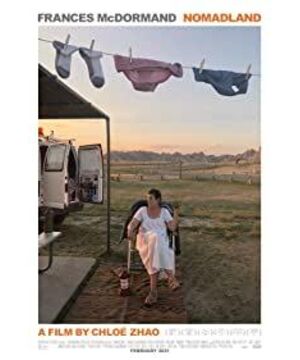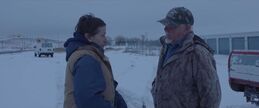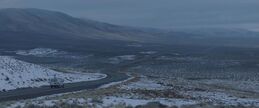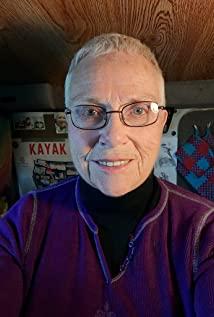Fern is the heroine in the movie "Nowhere to Be" (directed by Zhao Ting, starring Frances McDormand, released in 2020), in her fifties, widowed, unemployed, single, on the road, fighting odd jobs. Wendy is the heroine in the movie "Wendy and Lucy" (directed by Kelly Leichard, starring Michelle Williams, released in 2008), in her early twenties, single, unemployed, on the road, doing odd jobs , accompanied by a dog named Lucy. Fern and Wendy have Alaska on their itineraries, but they have different things going on on their journeys. This is an American road movie. The protagonists are all women, old and young. Their moving stories bring everyone a vision of wandering life. I have to say that compared to Wendy's, Fern's situation is like a middle class in the road circle, with a self-contained RV, some furniture, tableware, and finally a friend gifted a leisure chair, Fern can be in the open space Put up a chair, drink a coffee, play a sweater for a while... Wendy is a much poorer girl, I don't know why she started driving and wandering, but now her car is just an old HTC, all A big cloth bag can be carried around; Fern also has a very friendly circle of friends. As an RV family, she has a group of companions and a male friend who admires her. They resist the reaping and manipulation of mainstream society and use it on the road. , against the incorporation of the conventional order. They have anti-capitalist beliefs, and under the leadership of a spiritual leader, Bob Wells, bond, help and love each other, and live a utopian life; Wendy has only Lucy the dog, and because of stealing dog food Got caught and lost Lucy. During the dog search, she met an old security guard who helped her and a strange man who might be violent; the most critical moment for these people on the road was when the car broke down. Fern has a younger sister to turn to, and Wendy has an older sister. But she is the kind of relative who has never been able to ask for help. Because of this, she lost her car and can no longer drive around. This road movie can't go on, and the director stops in the scene where Wendy picks up the van. Where has she gone? Are you going to Alaska? She can't pick up the wrong car, can she? Why are they so different on the same road? because of age? Fern has worked for many years and is nearing retirement, she at least has the ability to buy herself an RV. Wendy may have just graduated from college or never, but in short, she is a young man with nothing, driving a second-hand car that is full of problems. Indeed, what kind of travel tools you have roughly determines your class on the road. What Fern brought us to meet is basically a group of people over fifty years old. They always have an RV and a bunch of belongings accumulated in their lives. When they feel that time is running out, The thing you want is loose stuff. Wendy was extremely poor. Except for a cotton blanket, she had no fixed objects. Maybe she was too young to need objects to witness memories. But she was so young, and even though Michelle Williams, as a young actress, had a face that was much more pleasing to the eye than Frances McDormand, director Kelly Leichhardt did not arrange for her any emotional drama. . We only see her embarrassed and alone in a sleepy town in Oregon, looking for her lost dog. Without a car, he had to stay in the woods, escaped after being raided by a delirious homeless man, and finally burst into emotions for the first time, crying hysterically in the public toilet. The elderly security guard gave her a little help, but otherwise it was empty, as empty as the nameless town. Under the camera of director Zhao Ting, Fern did not encounter any danger. The biggest danger probably comes from the sense of aging brought about by age. Under the lens of director Leichhardt, Wendy seems to be in a perilous situation, environment, people, events. Fern's field of vision has all the scenery that meets our imagination of road films, the vast land, the boundless highway, and the magnificent landform; the town where Wendy is located has no decent landscape, which can be lyricized by a long-range lens. At the beginning of the film, there are a few minutes of panoramic shots of the railway, explaining the geographical location of the town. In addition, at the end of the film, Wendy picks up the truck, and the continuous forest outside the speeding carriage is also an objective view. Therefore, "Nowhere" can be said to be more like a typical road type film, providing the necessary scenery and distance, and providing a romantic retreat of people incarnating in nature: pursuing freedom and rebelling against conventions. In addition to the Shakespeare poems that Fern read, and the long breath she repeatedly exhaled while leaning back on the reclining chair and facing nature, plus those who are equally affectionate in nature, and most importantly, plus a must not. The emotional power point of not wandering: a woman who rebelled against her family and had no children, endlessly misses her deceased husband. Does it have to be added? What does this morally strong reason bring to the character? Did it make her deeper? Those slashed wrinkles are more mournful and moving? That body that swims naked in the wild is more worried? If this is the case, this is equivalent to betraying all these people on the road, just escaping, just not facing it, just because we need a willing Other, so we are on the road! Fern, a fictional character, strung together various "heroes" on the road: Swanky, Linda May, Bob Wells... These experienced real travelers brought us the solid texture of wandering life. Fictional and non-fictional characters co-star in a road movie, and the director wants to maintain the roughness of the nomadic life. But if you are not careful, a layer of aesthetic pleasure will wrap around the roughness, creating into a realistic short-circuit. Those large landscapes, like footnotes on a book page, are notes on human behavior. The more annotated, the more the book enters the specialized intellectual space, receding from our natural reach. And the more scenery, the act itself loses or evades immediacy, loses or misses intuitive energy. The expression of the scenery in the road film is a test of the creator's consciousness. They are too easy to become the object of the fragile people's hope, absorbing a bit of the poor resistance and reflection after the collision of reality. People feel at ease that they have found a solution, so they indulge in wandering, and then they find that the real situation may be the same as Wendy. There is no allies to accompany you, no close temporary work, no goodwill, no love, and no one can support. The rear relatives, and even the scenery, are lackluster. What is even more terrifying is the danger of life caused by various violations, from nature, from people themselves - such as the heroes in "Wild Survival" and "Grizzly" who died in nature. Every homeless person is already a political appealer who is different from the mainstream, but if such appeals and appeals are only satisfied with the one-sided expression of people, it is a kind of delusion brought about by demands, which is ignored. The complexity of life requires only a simple confrontation. Instead of being an imperative to touch the contours of our lives, the way we think, feel and get out, the landscape just blunts and suspends our perception of reality. Who needs this overflowing landscape? Which pair of watching eyes are waiting for this exquisite free lunch box to be fed, so that they can sigh calmly "It's just that my hobbies in my life are natural!" People who are surrounded by pleasing tonal movies, food, books, commodities... These same-sex orders are probably the proud ones chosen by the heavens, and they are most qualified to show such affectionate feelings. The look of lewdness. Wendy interrupts this identity, and Wendy and Lucy is silent. If freedom cannot be decorated, uncontrollable, and full of surprises, people can only be silent in the face of it. Those who have escaped the seduction of the sirens' song may hardly escape their silence, for silence is a more deadly weapon than song. If speaking implies the danger of even a few lies, silence is a more powerful choice. At the end of the film, Bob Wells, a nomadic opinion leader, has a conversation with Fern. If you don't think about it seriously, this speech will easily fall into the chicken soup of Hollywood movies - there is always such a scene, and there is always such a person who is responsible for the sincere words. Wells' words are indeed used by the director to assume this function. But what’s interesting is that Wells rewrote the chicken soup feature, intentionally or not, to endow the conversation with “practical wisdom.” He and Fern discuss why people are on the road, Fern tells Wells that she can't forget her late husband Bo, and Wells talks about her dead son (this should be a fictional plot, and Will has not been found yet The information of children in real life of Sri Lanka is supported by the information), "There are many of our peers on the road, and everyone is in pain. Many people have not come out, it does not matter. What attracts me most about this kind of life is that there will be no Goodbye. I met hundreds of people on the road, I never said goodbye, I always say goodbye on the road. And it did, and I saw them again after a month, a year, sometimes years. I Looking ahead, I'm sure I'll see my son again, you'll see Bo again, and then you'll remember the time you spent together." Don't be too quick to complain that this is "self-deception," as anti-grief, comfort can be A definite way of mourning oneself, like Aristotle's catharsis. Are these caravans seeing old people on the road? It must not be a specific person anymore, something has been lost and reappeared, in the cup of coffee sipped in the sunset after a hard long journey, in the smell of gasoline when it starts to leave in the twilight of the morning light, in taking off that piece. In the cold cold where the skin of the swollen winter clothes is stunned... the things that have passed away in our lives reside in some kind of material object. We call it out and meet it like a soul. Because they want to meet these trivial objects again and again, so as to know life itself, some people will drop everything and pursue it. This may be the "practical wisdom" of modern nomads, the conviction of Bob Wells, and the The hard core of the wandering life after the correct filter. But this hard core falls in the movie, shouldn't it be filmed, not spoken? The director undoubtedly used the wrong position. The author of the original book "Nowhere to Be" Jessica Bruder writes of nomads, the fact that people struggle with inner optimism even when they go through the toughest challenges. This does not mean that they refuse to accept reality, but it highlights the fact that In the face of difficulties, people have unparalleled adaptability and the ability to seek a sense of value and belonging. When suffering shakes our determination to persevere, there will also be small joys, such as in the starry night with friends around the campfire and Sitting on one's knees. Wandering on the road, breaking away from the settled life and the domination of the mainstream social order, is a way of survival that people find in oppressive situations, a creative transformation of poverty and systemic incompatibility, a conception of evil topia face it head-on. But don’t heroically romanticize these everyday resistance wisdoms, “How can you communicate with someone who costs your dignity if it doesn’t come at the expense of your dignity?” Says a writer who chose to stay in Germany during the Nazi era. What’s important is to put aside the filter of aesthetic pleasure and analyze the growing trend towards distant and nomadic worship. What is there? A social contract that continues to disintegrate. And the gradually hollowed-out middle class? What else? Those are the artistic creations that really face the issue. That kind of creation may cost a lot and the challenges are even greater, but that's the only thing that remains in the heart of the young girl Wendy. Only with reserved dignity can it be possible to support her to reach the elderly Fern. See you down the road, see you on the road, there is no goodbye.tee
Published in the official account of "Movie Theater"
View more about Nomadland reviews











